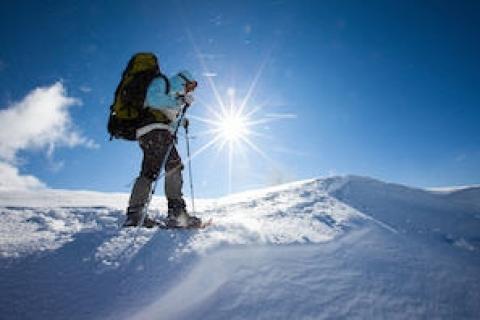
 When you’re hiking through the cold and snow of winter, it’s easy to remain in your summer-hiking mindset. Sure, you’ll stop for a drink of water and maybe consume a PowerBar every now and again along the way.
When you’re hiking through the cold and snow of winter, it’s easy to remain in your summer-hiking mindset. Sure, you’ll stop for a drink of water and maybe consume a PowerBar every now and again along the way.
But remaining in the good-weather mindset is one of the most dangerous things you can do on a winter hike. Due to the cold temperatures and extra energy it often takes to trudge through inches—or feet, in some cases—of snow, you burn calories much faster, and in much greater quantities.
How much more? Depending on the amount of snow and the temperature, you could burn between 100 and 500 extra calories per hour. And if you’re sleeping in a tent between hikes, that could diminish your calorie count even further, by an additional 1,000 calories. That means you need to eat that much more per hour to replace those lost calories—and energy.
The same general principle is true when it comes to consuming water, according to the Mayo Clinic. Their experts advise that: “You can become just as dehydrated in the cold as in the heat from sweating, breathing and increased urine production, but it may be harder to notice during cold weather.”
So, what tips, tricks and foods should you lean on to stay healthy on your next winter hike?
1. Keep water at room temperature.
To aide in your hydration, keep your water at room temperature so that it’s less likely to freeze but also boils easier if you need to use it to cook food in an emergency. Another tip: Don’t eat snow. Instead, melt it into water first, as the number of calories your body burns melting the snow needlessly uses up extra calories.
2. Snack on carbohydrates and fats.
Snacks such as dried fruit, beef jerky, peanut butter sandwiches and granola (try mixing it in hot water for a cozier snack) can give you the energy you need to handle the hike. A general rule of thumb: Keep in mind that carbohydrates digest faster than proteins, meaning they can be deployed faster for quicker energy. But fats are needed to help you digest those carbohydrates quickly.
3. Avoid snacks that freeze.
Beware of snacks such as PowerBars and candy bars, which can freeze solid, making them inedible.
4. You can’t go wrong with calorie-rich soups and stews.
They’re hot. They’re easy to make. They pack a caloric punch. And did we mention that they’re hot? If you’re camping on a longer expedition, or you’re doing anything more than a few-hour hike, warming a stew or soup over a fire can recharge your energy reserves like nothing else.
What’s your favorite winter-hiking snack or beverage?
- 2679 views

